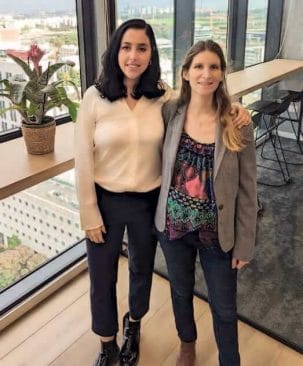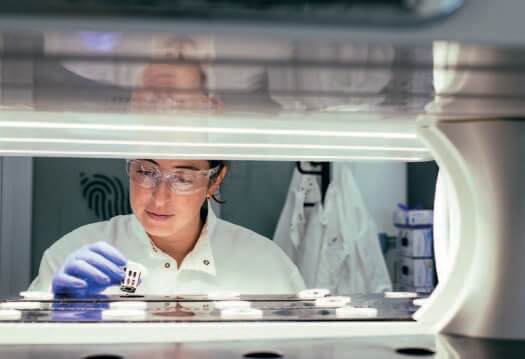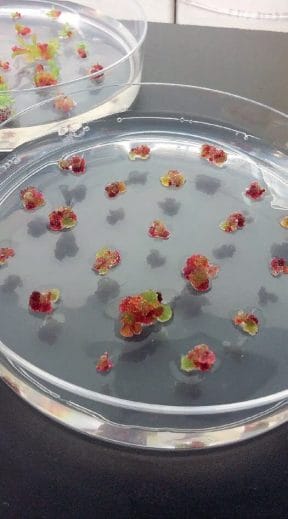
Editor’s Note: This time, Deanna’s column highlights companies that are using technobiology to bring the cosmetics and personal care industry into the future. She interviewed experts working at the intersection of tech and biology.
“The next breakthrough innovation in cosmetics will come from the combination of nature and AI.” That’s what Dr. Hilla Ben-Hamo, CEO and Co-Founder of MeNow, told me when I started asking around about the use of artificial intelligence in various beauty ingredient selection and development platforms.
MeNow and countless other ventures in and adjacent to the cosmetics and personal care industry are using high tech tools to solve biological challenges – ecological, botanical, mycological, dermatological, physiological, etc. We are able to do more, faster and better, with all forms of biology thanks to high tech. And there is no turning back now.
Screening Naturals with AI to Expedite Ingredient Discovery and Development
MeNow is a software that predicts the skincare benefits of natural ingredients and blends. The Tel Aviv, Israel – based company was founded in 2021 by Ben-Hamo and Dr. Coralie Ebert, who serves as CTO.
You may recognize MeNow if you’re an avid reader of my Beauty Insights newsletter. In early 2023, I covered news of the company’s partnership with Green Mountain Biotech. Their project
involved running a selection botanicals through the MeNow software, which then predicted the “effect of not only individual herbs and other plants on various skin conditions, but also the
effect of botanical blends.”
Or if you follow international product launch news, you may have seen the new Le Soin du Voyageur serum from Paris-based Les Bois. For this formulation, MeNow’s “AI analysis uncovered intricate ingredient interactions, unlocking a host of potent skin benefits while focusing on local and natural ingredients,” which is important to the brand, as Les Bois takes its inspiration from the French forest. A MeNow announcement explains how the brand leveraged their technobiology: “AI highlighted the power of Urtica dioica (stinging nettle), Salix alba (White willow), Avena sativa (Oats), Quercetin, Epigenin, Tocopherol, EUK134, and Vitamin C.
Their combined action [promises] skincare results like never before.”
In our interview for this article, Ben-Hamo shared another example of the MeNow SaaS (software as a service) in action, saying, “we have identified and patented a unique family of previously unknown diterpenoids, exclusively found in Croton tiglium, a plant from the traditional Chinese pharmacopeia, with unmatched potential for skin soothing.”
And Ebert helps us understand the company’s tech in more detail, explaining that “MeNow patent-pending technology combines QSAR (Quantitative Structure Activity Relationship) algorithms and deep Bayesian networks to predict the effect on the skin of natural actives. A QSAR algorithm is used to predict the biological activity of single molecules based on their structure and chemical properties. The results are then integrated using a Bayesian virtual model of the skin (built using omics data) in order to predict the effect on various skin conditions and target population and to make predictions for extracts and combinations of ingredients.”
Importantly, this tech isn’t just a cool online tool to verify what cosmetic scientists already know about naturals, it’s a highly efficient means to discover novel ingredients. Ben-Hamo tells me
that “There are over 300,000 plant species, around two million bioactives, but less than 1% of them has been studied for skin benefits. The potential for those unexplored natural ingredients” she emphasizes, “is tremendous. Mapping all of those organisms and bioactives is bound to lead to many breakthroughs in skincare and hair care.”
Ebert backs her up, noting that the MeNow “platform excels in predicting not only individual compound outcomes but also their collective behaviors, accounting for synergistic and competitive effects that characterize complex natural compositions. All these predictions are powered by a unique database that includes information on the molecular composition of over 60,000 organisms.
This allows us to make predictions for ingredients that are not currently being used in the industry (enabling the discovery of novel bioactives and botanical complexes) and for which limited or nonexistent information is available.”
Ebert also speaks to the potential of this technology in relation to biotech ingredient development: “our technology can be used to support the production of biotech ingredients,” she says. “Since our predictions are made based on the molecular structure (all it needs to work is the SMILES of the molecule), it can be used to design compounds with the highest potential to address a given skin condition or to target a given biological pathway.” In case it helps, SMILES stands for Simplified Molecular Input Line Entry System; and these are basically the two-dimensional line representations of a molecule, which of course exists in three dimensions.

Leveraging Technobiology to Scale Scarce Botanicals for Beauty Applications
Ayana Bio, a biotech company out of Boston, Massachusetts, in the States, has put high-tech tools to work to solve biological challenges too. Or as CEO Frank Jaksch puts it, “Ayana Bio takes
an information-rich approach to plant cell cultivation, using artificial intelligence and machine learning.”
“We use AI,” he says, “to analyze hundreds of plant cell lines simultaneously for the most promising starting points, allowing us to find, create, and scale complex plant molecules for industries like food and beverage, and cosmetics, that depend on the highestquality
ingredients. In contrast, other companies [those not working with technobiology] can only focus on one cell line at a time.”
“Ayana Bio is,” at least according to Jaksch, “also the only company to use high throughput synthetic biology capabilities like sequencing, omics technology, and analytical chemistry to select the best plant cell lines at a massive speed and scale. Transcriptomics and metabolomics workflows are our bread and butter, meaning we monitor the genes being turned on or off and the molecules inside our cells under hundreds of different conditions.”
And this translates into efficiency in innovation: “Metabolomics and transcriptomics datasets are interesting and informative alone; but we can gather even greater insights by correlating them
using machine learning. Ultimately,” he says, “machine learning helps us predict and control how our plant cells will respond to different treatments, which helps shorten the development
timeline.”

Earlier this year, Ayana Bio announced a seven-figure joint development agreement with Wooree Green Science. The deal will mean that biotech saffron (among other ingredients) will soon be
added to the Plant Cell Advantage (PCA) line of ingredients in Ayana’s portfolio.
So I asked Jaksch why biotech was a good strategy for bringing saffron into beauty at industrial scale. He first pointed out the challenges of agricultural production: “Saffron, like many other
botanical ingredients with cosmetic applications, faces a complex and uncertain future as it grapples with shifting weather patterns, pollution and water shortages in the limited number of
countries where traditional production happens. The plant requires labor-intensive harvesting, taking up to 170,000 flowers to produce just one kilo of saffron, making it a prohibitively expensive ingredient for cosmetic products.”
He then outlined the Ayana Bio approach, saying, “Growing authenticated saffron plant cells in stainless steel tanks … can deliver the benefits of saffron bioactives without the quality and consistency issues that come from the constraints of conventional agriculture, including climate change. Combined with high throughput synthetic biology capabilities like sequencing, multiomics technology, and analytical chemistry, plant cell cultivation can select the best plant cell lines at a massive speed and scale to develop the highest-quality saffron ingredients.”
Ayana is not only bypassing an agricultural supply chain but also investing to shorten the biotech supply chain. Jaksch tells me “Ayana Bio is developing process engineering capabilities inhouse
and has the entire workflow from discovery, improvement, and scaling under one roof.”
And he wants beauty makers to know that, “In addition to developing the latest Saffron PCA™ ingredient, Ayana Bio’s Plant Cell Advantage™ ingredient portfolio is composed of Echinacea-p
PCA™, Lemon Balm PCA™ Dog Rose PCA™, Wood Betony PCA™ and Sage PCA™.”
Making Vegan Proteins for Skincare and Hair Care with Technobiology
In early 2018, a biotechnology research company based in Emeryville, California, in the States became the first ingredient company to win a CEW Innovation Award (from Cosmetic Executive Women).
And the award-winning ingredient was that company’s first launch, a vegan collagen called N-Collage™, which has since been rebranded as Collume™. And Geltor has gone onto launch four
more vegan proteins since then, collagens for skin and hair as well as an elastin.
Geltor’s ingredients are all certified vegan, cruelty-free, non-GMO, halal, USDA BioPreferred, and readily biodegradable. They are, of course, all made possible thanks to technobiology.
Matthias Foerster, the company’s Business Director in EMEA and ASIA, calls Geltor’s Biodesigner AI™ “the heart and start of our technology platform.”
He describes the tech further saying, “A system of computational programs, coupled with expert protein engineering, can distill trillions of amino acid sequences into a short list of potential
candidates based on a targeted performance or function. These candidates then undergo additional optimization and testing for performance and viability. With continual learning and an
ever-growing protein library, AI enables speed and accuracy and propels innovation.”
Geltor is using technobiology (and biotech) to solve different biological challenges than Ayana Bio: As Geltor’s Foerster explains, “Beauty can be demanding in the best possible way. Consumers and brands want more – more transparency, more innovation, more efficacy, more sustainability, etc. Biotech can be a highway to achieving all these things and more. With biotechnology,” he says, “we can go beyond what’s purely accessible or available from nature and design vegan ingredients that fulfill a need. Relying on a precision fermentation manufacturing process (that scales to commercial volumes), innovative ingredients can come
to life sustainably and reliably.”
Surveying Beauty’s Technobiology Innovations and Investments
Geltor, Ayana Bio, and MeNow are just a few of the companies using technobiology to bring the cosmetics and personal care industry into the future. There are so many companies doing so
now that I won’t even pretend to mention them all. But here are a few other that have been making news in recent years:
“Cell-free biomanufacturing is not science fiction: it is here … We are delighted of our partnership with Debut to create together stand-out active beauty innovations while protecting the planet’s
resources.” This is a statement that Barbara Lavernos, Deputy Chief Executive Officer in charge of Research, Innovation and Technology at L’Oréal, shared with the press last summer when
the beauty makers’ corporate venture capital fund (known as BOLD) invested in Debut Biotech.

Debut is headquartered in San Diego, California, US, and specializes in advanced fermentation technology and “AI-powered data intelligence” to identify and manufacture ingredients that L’Oréal describes as “complex natural products, such as polyphenols, biopolymers, and natural colors.” And their timeline is impressive; Debut can go from ingredient discovery to pre-production in as little as six weeks.
More recently, 310.ai was invited to join the new Ginkgo Technology Network – a Ginko Bioworks initiative launched to further support Ginkgo’s customers in their R&D work, “helping eliminate
the siloing and switching costs” that often limit progress, according to a press release about the Network.
The Copilot platform from 310.ai is all about user-friendly AI molecular design. And as I shared in the Beauty Insights newsletter in early March, the company is making this a reality by leveraging GPUs.
Graphic Processing Units are electronic circuits that make it possible to speed up the computational process. And computational processes are when an abstraction (which is knowledge or information taken, shall we say, out of context; it’s what can be perceived without details such as space, time, or tangible physical properties) takes several factors into consideration and turns up a precise solution.
What this means for cosmetic ingredient development is that thanks to 310’s Copilot platform, beauty scientists can use webbased chat to design, visualize, and run molecular models. Similar
to how ChatGPT turns your text prompts into dynamic socials posts, the 310 Copilot platform turns your text prompts into novel molecules – the beauty ingredients of tomorrow.
GenScript Biotech is yet another company that’s working with AI technology to solve biological challenges. Almost 4 years ago, scientists at GenScript published an article in the International
Journal of Cosmetic Science documenting how “using an artificial intelligence (AI) approach, we identified peptide RTE62G (pep_RTE62G), a naturally occurring, unmodified peptide with
ECM [extracellular matrix] stimulatory properties. The AI-predicted anti-ageing properties of pep_RTE62G were then validated through in vitro, ex vivo and proof of concept clinical testing. A
deep learning approach was applied to unlock pep_RTE62G from a plant source, Pisum sativum (pea) …,” according to the abstract.
And in late 2022, GenScript teamed up with Alloyzymes to offer molecule discovery and engineering services for researchers working with enzymes and proteins.
As high-tech solutions advance to be able to process and store increasingly vast amounts of data, then more genome sequencing and other omics data about plants, fungi, people, and other
organisms; more detailed QSAR modeling; more nuanced virtual skin models; etc., will be cataloged, developed, and exploitable by scientists eager to discover and to design the beauty ingredients of tomorrow.

Deanna Utroske
Deanna Utroske is Editor of the weekly Beauty Insights newsletter and one of the most well-respected critical thinkers in the cosmetics and personal care industry today. She serves our industry as a public speaker, writer, and consultant for supply-side companies.
As a regular contributor to this publication, Deanna writes the Global Perspectives column, covering cosmetic and personal care product formulation trends, emerging ingredient science, and ingredient marketing trends impacting the future of beauty around the world.
As a public speaker, Deanna addresses company teams, higher-education classrooms, and event audiences. She’s spoken at Cosmoprof Worldwide Bologna, in-cosmetics global, MakeUp in Los Angeles, NYSCC Suppliers Day, the Anti-Ageing Skin Care Conference, the International Cosmetics Innovation Conference, Cosmoprof North America, the AIRS International Conference on Genomics & Microbiomics, and many others.
Learn more and find a link to subscribe to the Beauty Insights newsletter at www.DeannaUtroske.com



